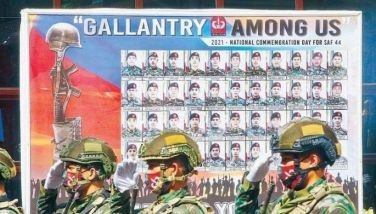Germany wants NAIA-3 row settled
MANILA, Philippines - German Ambassador Christian-Ludwig Weber-Lortsch called on the administration yesterday to do away with the “ghosts of the past” created by the Ninoy Aquino International Airport Terminal 3 (NAIA 3) and to bring the parties to the negotiating table.
In a statement, Weber-Lortsch said the Supreme Court has ruled that no acts of ownership are allowed until full payment of just compensation by the government to Philippine International Air Terminals Co. (Piatco) and its investors.
“Thus present operations and tenant agreements on NAIA 3 are considered illegal, as the parties involved including the German government reserve all rights and waive none,” he said.
“As a way out of this impasse, I am still optimistic that the new administration, in line with its investment priorities, will bring the parties involved to the negotiating table in order to facilitate a legal, fair and timely solution for an inherited problem,” he said. “It is time to look forward and do away with the ghosts of the past.”
Weber-Lortsch said the unresolved expropriation case of NAIA 3 remains the largest impediment to negotiations.
“Since my arrival in August 2007, I have committed myself to bring business and jobs to the Philippines,” he said.
“Unfortunately, the largest impediment to this day remains the unresolved expropriation case of the NAIA 3 terminal,” he added. “Not only for German, but also for European and other international investments. The German government, through its partial investment guarantee, suffered the biggest loss of its kind in the last years.”
Weber-Lortsch said the government’s failure to compensate a German contractor for its expropriation of the $650-million NAIA 3 had adversely affected relations between the Philippines and Germany.
“German businessmen have been naturally stung by the airport expropriation,” he said.
Weber-Lortsch said the government’s takeover of NAIA 3 led to the loss of millions of dollars.
German-owned Fraport is the primary investor in Piatco that procured the concession to construct and operate NAIA 3.
De Jesus: No effect on NAIA 3
Transportation and Communications Secretary Jose de Jesus said government efforts to open the NAIA Terminal 3 will not be affected by the recent decision of the Washington-based International Centre for Settlement of Investment Disputes (ICSID).
Speaking over radio dzRH, De Jesus said the ICSID ruling does not have any effect on efforts to open the terminal to full international and domestic operations.
“The point of view of the DOTC which was tasked to fast-track the completion and full operationalization of the NAIA 3 by President Aquino, is that (ICSID case filed by Fraport AG) is part of the legal process that is going on in parallel with our effort to open, to complete the NAIA 3,” he said.
NAIA 3 is being partially operated, mainly serving the domestic and international flights of local budget carriers Cebu Pacific Airways, PAL Express and Air Phil Express.
De Jesus said the decision allows the hearing of the case to proceed against the government.
“We’re proceeding accordingly,” he said.
“We’re in discussions with the contractor for the completion, the testing and commissioning of the NAIA 3.”
De Jesus said the DOTC plans to finally open NAIA 3 to full commercial operations by yearend.
“Unless there are legal interruptions, disturbances, we aim to finish that by the end of this year,” he said.
Ochoa: It’s back to zero
Executive Secretary Paquito Ochoa Jr. said it was “back to zero or back to square one” for Fraport.
Sources said the pieces of evidence against Fraport submitted before the ICSID were intact, and that the case against it was strong.
If Fraport decides to file another case, the government could present more evidence on how it violated the local laws in conducting business in the country, sources added.
Malacañang is studying various proposals, according to sources.
Sources said a recommendation was made to enter into negotiations with Fraport for the compensation, which could also repair ties with Germany.
However, sources said these were all suggestions for now, and that the government would be ready to prove its case against Fraport if it wants to proceed with another case before the ICSID.
Ochoa said the ICSID decision essentially meant that procedures were not followed in a case involving Fraport.
The Dec. 23 decision voided the Aug. 16, 2007 ruling of ICSID, which barred Fraport from filing any claim for compensation because it violated Philippine laws to win the contract for NAIA 3.
Ochoa said ICSID ruled that Fraport was not given the chance to fully submit evidence so it reversed its August 2007 decision.
“The net effect of the decision is we were back to square one,” he said. “Back to zero.”
Ochoa said the government’s position was that the expropriation proceedings on NAIA 3 were favorable to the Philippines, and that just compensation would be determined based on evidence. Ochoa sees no more reason to return NAIA 3 to its builders.
“The rules of expropriation are once the government files its expropriation proceedings, it is already entitled to possession,” he said.
“There is only a requirement of deposit of so much amount, those are the rules there. So that was done even before our time and so NAIA 3 was operated partially. Meanwhile, while the government is there, the owners or the contractors, would have to claim payment as only recourse. And that is also subject to the same case of expropriation.”
Ochoa said the government would not appeal the ICSID decision because it would not affect its possession of NAIA 3.
“Yes, (operations) will continue. It has no effect as far as we are concerned. That decision has no effect in the operation of NAIA 3,” he said.
Cadiz: Decision has no impact
Solicitor General Jose Anselmo Cadiz said the ICSID decision was based on a procedural ground and had no impact on the merits of claim for compensation by Fraport.
“Rather, the decision merely provides Fraport the opportunity to commence a new arbitration and to present its claim again,” he said.
“Likewise, the Philippine government is entitled to present evidence against Fraport again.”
Since 2002, the project to construct and operate NAIA 3 has been the subject of a string of civil and criminal investigations due to alleged violations of Philippine laws by Piatco and Fraport.
In May 2003, the Supreme Court ruled that NAIA 3 concessions were void from the beginning due to Piatco’s violations of the Constitution, Build- Operate-Transfer Law, banking laws and public policy.
Subsequently, the Department of Justice, the Office of the Ombudsman and the Anti-Money Laundering Council initiated criminal investigations against Piatco and Fraport officials on charges that they violated the Anti-Dummy Law and Anti-Graft and Corrupt Practices Act.
In August 2007, ICSID dismissed Fraport’s bid to collect $425 million from the government after the German firm was found to have violated the Anti-Dummy Law in a complaint lodged by the Philippines.
In late July, an arbitration before the International Center of Arbitration of the International Chamber of Commerce similarly dismissed Piatco’s claims due to violations of the Anti-Dummy Law.
Aquino: EO on open skies out this week
President Aquino said yesterday that the executive order on pocket open skies in four secondary international airports would be out this week.
“We’re just re–affirming the case, and I don’t have the list of the airlines that have already signified their interest to enter into this new avenue,” he said.
Aquino said the new EO will modify EO 219 allowing a liberalized air policy as early as 1995.
“Our national development requires promoting an open and competitive international aviation sector that enables Philippine and foreign air carriers to expand their operations, maintain a strong Philippine-based aviation industry, and ensure international connectivity in order to allow Philippine and foreign air carriers to plan and make long-term investments in the Philippine market,” he said.
Aquino said the EO will focus on secondary gateways and that local airline operators would have exclusive rights to fly domestic routes.
Airlines would not be allowed to carry passengers between two domestic points, he added.
De Jesus said the EO will cover international airports in Cebu, Davao City, Zamboanga City and Laoag City.
The EO was drafted by a committee comprised of representatives from the Department of Tourism, Department of Justice, the DOTC and the National Economic and Development Authority, he added.
Tourism Secretary Alberto Lim had suggested the adoption of an open skies policy. — With Rainier Allan Ronda, Aurea Calica, Edu Punay
- Latest
- Trending






























